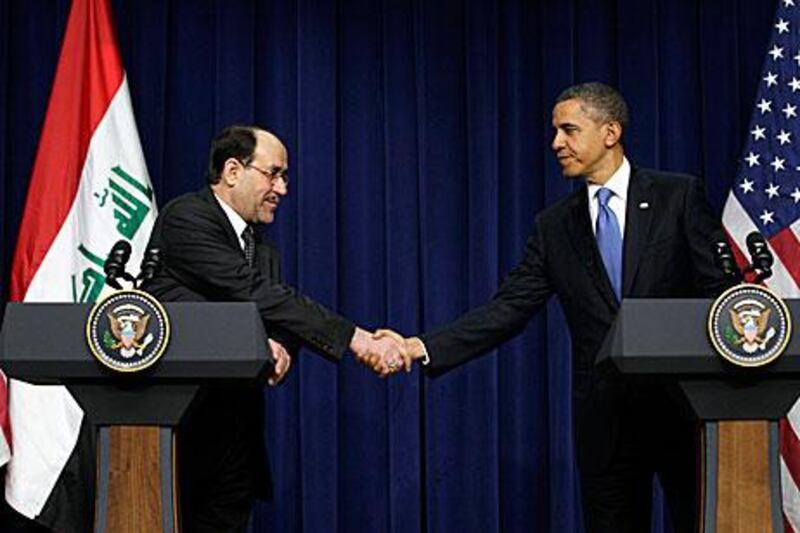WASHINGTON // Barack Obama, the US president, heralded the end of the divisive Iraq war yesterday, and warned Iraq's neighbours that the United States would remain a major player in the region even as it brings its troops home.
"Our strong presence in the Middle East endures," Mr Obama said. "And the United States will never waiver in the defence of our allies, our partners and our interests."
Speaking after meeting with the Iraqi Prime Minister Nouri Al Maliki, Mr Obama said other nations must not interfere with Iraq's sovereignty. While he stopped short of mentioning any countries by name, US officials have been closely watching how neighboring Iran may seek to influence Baghdad after US troops withdraw.
Yesterday's meetings came as the last American troops were preparing to leave Iraq ahead of a December 31 deadline, almost nine years after the US invasion. Just 6,000 US forces remain, down from a high of 170,000 in 2007.
"Our war in Iraq ends this month," Mr Obama said, with Mr Al Maliki by his side.
Mr Obama and Mr Maliki were understood to be ready to reaffirm their commitments to the non-military parts of a 2008 strategic framework agreement - which initially stipulated 2011 as the date for a US withdrawal - on issues such as energy, trade, education and investment.
Mr Obama has tried to paint the withdrawal as a promise fulfilled, as ending the Iraq war was a key campaign promise for Mr Obama in 2008. But the US would almost certainly have retained a military presence in Iraq if agreement had been reached on granting US troops immunity from prosecution in local courts.
As it is, the US will maintain a small military presence at its embassy in Baghdad, which, with some 16,000 employees, is the biggest US diplomatic mission in the world.
A small number of troops and military contractors are staying in a training role, and more may join them if Iraqi politicians can agree on what kind of role they would play.
Those discussions may gain some momentum with Nato announcing earlier yesterday that it would also pull its troops at the end of the year, rather than at the end of 2013.
A statement from Anders Fogh Rasmussen, the Nato secretary general, said the decision to end a mission that started in 2004 was made at a meeting of alliance ambassadors in Brussels.
Security in Iraq has significantly improved over the past years but still remains precarious. Concerns about stability are widespread and much depends on a fragile power-sharing agreement between the country's Shiite, Sunni and Kurdish parties.
Iraqi security forces now number an estimated 900,000 troops.
The US and Iraq said the forces were sufficiently trained to maintain order, but few believe they will be capable of securing Iraq's borders or air space.
Iraq's role in the region, and the role of regional powers in Iraq - notably Iran, with whom Iraq's relations have improved since the fall of Saddam Hussein - was likely also to be a focus for discussions.
[ okari@thenational.ae ]





